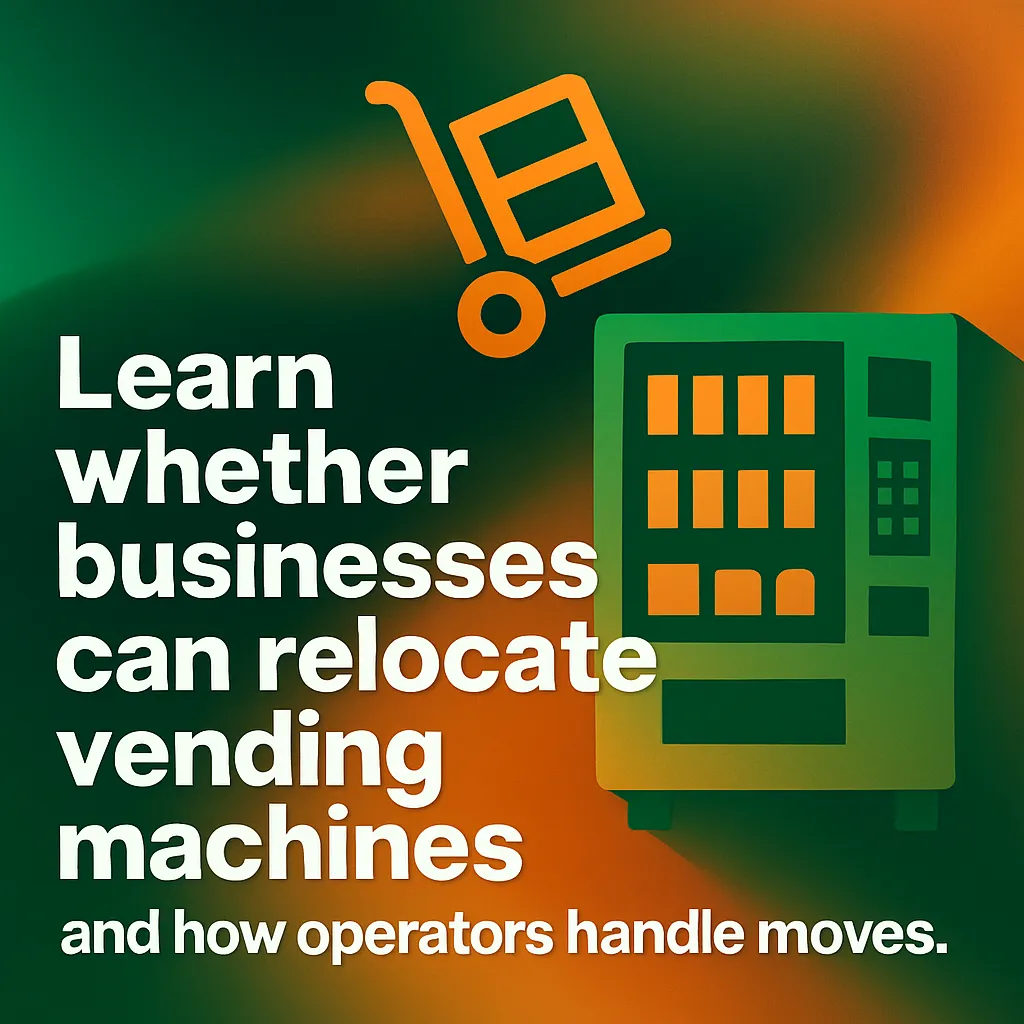Can a Business Move a Vending Machine?
Learn whether businesses can relocate vending machines and how operators handle moves.
Back to Vending FAQs ResourcesLearn whether businesses can relocate vending machines and how operators handle moves.
Back to Vending FAQs ResourcesMoving a vending machine isn't as simple as sliding a refrigerator. These heavy, complex units require professional handling to prevent damage and ensure safety.
![]() Vending machines are heavy and can cause injury if moved improperly
Vending machines are heavy and can cause injury if moved improperly
![]() Improper moves can damage internal components, leading to costly repairs
Improper moves can damage internal components, leading to costly repairs
![]() Professional operators have specialized equipment and insurance for safe relocation
Professional operators have specialized equipment and insurance for safe relocation

For many businesses, a vending machine becomes an integral part of their daily operations, providing convenient snacks and beverages to employees and customers. However, situations like office renovations, departmental reorganizations, or even a complete business relocation can necessitate moving these large pieces of equipment. The immediate question often arises: "Can a business simply move a vending machine on its own?" The short answer is usually no, and for good reasons.
Vending machines are not only heavy, often weighing hundreds of pounds, but they also contain intricate internal mechanisms, refrigeration units, and sensitive electronics. Attempting to move one without proper tools, technique, and expertise can lead to significant issues. This includes serious personal injury, internal damage to the machine that could void warranties, and potentially damage to your property during transit. The best practice is always to consult with your vending machine operator or the company that provided the machine.
Professional vending operators have specialized equipment, such as heavy-duty dollies, lifting straps, and ramps designed specifically for vending machines. They also have trained personnel who understand the nuances of safely disconnecting, transporting, and reconnecting these units. This ensures the machine's integrity, prevents accidental damage, and maintains compliance with safety standards.
When you anticipate a need to move your vending machine, communicate with your provider as early as possible. This allows them to schedule the relocation efficiently, often integrating it with your business's operational timeline. Whether it's a temporary shift for a few days during a remodel or a permanent move to a new building, planning ahead is crucial. The operator can assess the new placement location for essential considerations like power access, level flooring, and adequate space for servicing the machine. They can also advise on any potential costs associated with the move, depending on the terms of your service agreement.
Ignoring proper procedures could lead to unexpected expenses. Damage incurred during an unauthorized move might not be covered by your service contract, leading to repair or replacement costs. Moreover, attempting to move a refrigerated machine without proper preparation can compromise its cooling system, resulting in spoilage if the machine contains perishable items. Always clarify the terms of your contract regarding relocations; some full-service agreements may include minor moves as part of their package, while others might charge a fee depending on the complexity and distance. Understanding the specifics of your vending contract is vital for managing these situations smoothly.
In addition to physical damage and contractual implications, businesses should also consider the operational continuity. A vending machine out of service for an extended period due to improper handling can lead to dissatisfaction among employees and customers who rely on it for snacks and drinks. By entrusting the relocation to experts, businesses can minimize downtime and ensure the machine is up and running in its new spot efficiently.
Furthermore, if you're exploring new vending options or services for your business as part of a move or restructuring, it's a good time to evaluate your needs. Providers can offer insights into optimal machine placement, product selection, and even alternative options like micro markets if your new space allows. The overall goal is to maintain the convenience and benefits of on-site refreshments without the added stress or risk of improper handling.
It is generally not recommended for a business to move a vending machine independently due to its weight, complexity, and potential for damage or injury.
Typically, the vending machine operator or a professional moving service is responsible for relocating a machine. They have the specialized equipment and expertise.
Risks include personal injury, damage to the machine (which can be expensive to repair), damage to the property, and voiding warranties or service agreements.
The business should contact their vending machine operator immediately to discuss relocation needs and schedule a professional move.
Unauthorized or improper moves can indeed void warranties and may incur charges or penalties under service agreements. Always consult your operator.
The cost varies depending on the distance, complexity of the move, and terms of your vending contract. Some operators include moves as part of their service.
Professional movers use specialized dollies, straps, ramps, and sometimes forklifts or pallet jacks to ensure safe transport.
Yes, vending machines can be moved permanently. The operator will assess the new location for suitability (power, space, traffic) before relocation.
Inform your vending operator well in advance so they can arrange temporary removal and reinstallation, often coordinating with your renovation schedule.
Ensure clear access to the machine for movers, and verify the new location has adequate space, power outlets, and a stable, level surface.